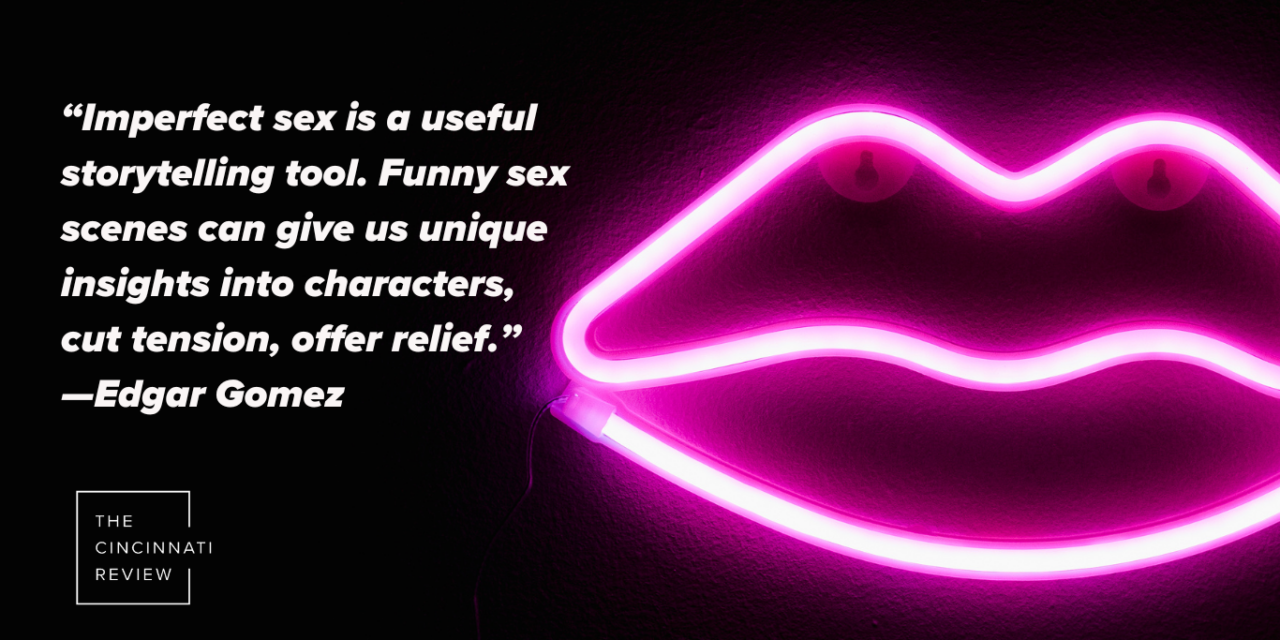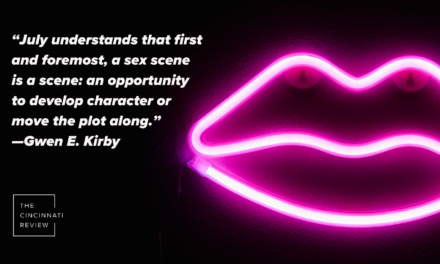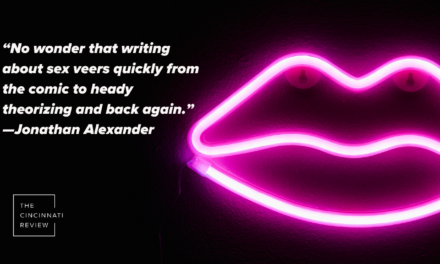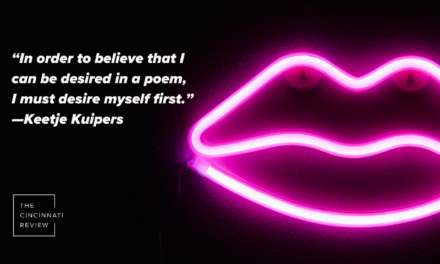To accompany our fall 2024 issue (21.2), we have curated a folio on writing about sex (reviews and craft essays) after noticing that several pieces in the print issue include sex, especially the play excerpt by Gloria Oladipo, John Fulton’s story “Emily Leaves Switzerland,” Karolina Letunova’s story “Turn Your Back to the Forest,” and poems by Keetje Kuipers and Jessica Nirvana Ram. We reached out to five writers to get their contribution to the conversation.
Here is Edgar Gomez’s craft essay:
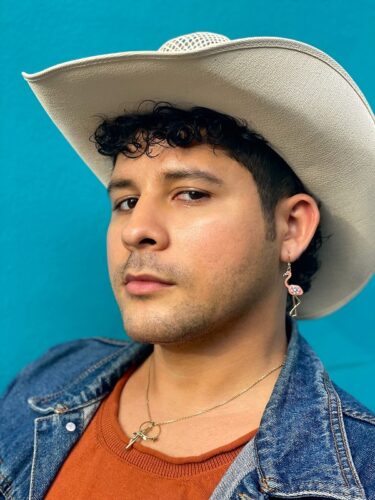
On the Literary Merits of Funny Sex
Funny sex is underrated. Don’t get me wrong: I love reading all kinds of sex scenes. The sweet, romantic ones full of tender caresses and poetic descriptions of the moonlight through the window; the desperate, feverish, fuck-me-in-the-backseat-of-this-Honda-Civic kind. I’m really not that picky. But it’s the funny sex scenes that speak to my spirit the most. To be clear, by “funny” I don’t mean “this sex scene is written so badly that I can’t stop laughing.” I mean sex scenes that are true to the ways sex, aside from being sexy, can also be a little silly or awkward or go terribly, hilariously wrong. As a reader, I’m not interested in perfect characters who don’t ever make mistakes, so why would I want that with the kind of sex they have?
For writers, imperfect sex is a useful storytelling tool. Funny sex scenes can give us unique insights into characters, cut tension, offer relief. They can build trust by demonstrating that the narrator is willing to be honest, even at their own expense. In memoirs, especially those that feature a lot of traumatic material, they can imbue the story with hope by subliminally signaling to readers that the writer has reached a point in their lives where they can look back and laugh.
I’m not someone who believes everything needs to be funny, at least not only funny. The best sex scenes, like all writing, resist simple categorization. They’re not just one thing or another, but sweet and horny and hopefully contain a few laughs too, similar to how a pastry recipe can call for sugar and salt and milk, each ingredient complementing the one that came before. So, if you’re looking to add more range to the sex in your stories, here are some suggestions.
Take a step back.
In her essay “Mind Fuck: Writing Better Sex” in The Sewanee Review, the writer Melissa Febos argues that, on a technical level, writing a sex scene is “exactly the same as any other scene,” which requires us to talk about “plot, dialogue, pacing, description, and characterization.” Febos writes: “Our isolation of sex from other kinds of scenes is not indicative of sex’s difference, but the difference in our relationship to sex.” In other words, it’s not that writing a sex scene is difficult, it’s that our relationships to sex can be difficult, and that makes it harder to approach the page than if we were writing a nonsex scene. Many writers can get stuck worrying about what readers will think, how their families will react, being misunderstood or judged.
With that in mind, my first suggestion, especially if you’re writing creative nonfiction and working from a real memory, is to just write the sex scene exactly as it happened, with as little adornment as possible, and don’t trouble yourself with finding what’s funny about it . . . yet. Focus instead on concrete details: the size of the bed, what clothes each person was wearing, how the room was decorated. This may seem counterintuitive, but the goal here is to simply see all the material you have to work with, like laying out all the puzzle pieces before you begin to assemble the picture on the box. Writing about sex can be difficult enough; there’s no reason to put even more pressure on yourself by trying to come up with jokes at the generative stage.
Once you’ve written the sex scene, go on a walk or take a few days off, and then revisit it with fresh eyes. Often when we write sex scenes, we’re so focused on the steamy main event (understandable!) that we lose sight of everything else that’s going on. A change in perspective will allow you to see the big picture again, and it’ll be easier to notice absurdities (think specificity, like, was there something weird playing on the TV?), pinpoint what details to zoom in on for comedic effect (Flamin’ Hot Cheetos crumbs on the sheets?), and make interesting connections.
This passage from Susan Minot’s short story Lust always makes me laugh because of the comparisons she makes, and the way she structures the final line with a mystery and reveal give it the feeling of a punchline:
Tim’s was shaped like a banana, with a graceful curve to it. They’re all different. Willie’s like a bunch of walnuts when nothing was happening, another’s as thin as a thin hot dog. But it’s like faces; you’re never really surprised.
With the scene set on the outside, now you can also have your narrator interact with it on the inside. Memoirists, time is your friend here. Give yourself as much time as you can to remember, using the concrete details you wrote when initially setting up the scene to spark your memory. What’s going through your narrator’s mind in the sex scene? Are they excited and tripping over furniture on the way to the bedroom? Are they feeling insecure and desperately searching the walls for a light switch? What intrusive thoughts are they having?
Here is an example from Jean Kyoung Frazier’s novel, Pizza Girl (Anchor, 2021). Our narrator is eighteen years old, pregnant, and having a hard time concentrating on the sex she’s having with her boyfriend.
I’d be starting to feel good and then my eyes would focus on something, anything, and I would spiral.
An old orange peel peeking out of the trash can would make me wonder what I tasted like. Was it something distinct and nameable? If someone kissed me would they later tell their buddies how my lips were orangey? Probably not, it was probably something unfruity, how could you taste like anything unless you were constantly eating it? Best-case, I have burrito lips.
This self-deprecating passage leads to the narrator imagining herself having amazing sex with another character in the book, which ends:
I came hard, grabbing Billy’s ears tight and pulling him into me. I squeezed my eyes shut, tried not to leave Jenny or the living room, but I couldn’t will myself back, only the random spots and patterns of color would flash across the dark of my lids.
See? You can have it all! Burrito lips and hot sex.
Look outside the sex.
Often, the sex itself is not the most hilarious thing in your sex scene (we can hope . . . ), at least not as funny as the context surrounding the big moment. The buildup. The expectations. The stakes. As you write, don’t limit yourself to just the sex. Look at the entire situation.
Generally, for a situational comedy we need two main ingredients: a character who wants something, and an obstacle getting in the way.
By obstacle, I don’t mean that a mysterious eye-patch-wearing villain needs to suddenly appear to mess everything up for our narrator (though that would be very funny and hot). The want could be something like privacy, which the narrator may not be able to get because they live at home with their parents or have nosy roommates. Or the want could be as universal as wanting to look like you know what you’re doing! Obstacle: It’s the narrator’s first time.
Here’s one such example from Greg Mania’s memoir, Born to Be Public (CLASH Books, 2020). It’s a losing-your-virginity scene, which he prefaces by saying: “I know this is going to sound bad, but sex, to me, wasn’t a Special Event. I tossed my virginity away as if it were a pair of old sneakers that I was ready to part with.”
True to his word, the actual sex in the scene passes by fairly quickly. It’s Mania worrying that he hasn’t done enough research that makes for great material for this situational comedy.
Since this was my first time, I didn’t know what to do. I should kiss him, right? Or does he make the first move? Would he notice if I pulled up a wikiHow on my phone? Thankfully, he made the first move.
He started kissing me and fiddling with my belt buckle. . . . I didn’t know if I was a “top” or a “bottom,” nor do I know how we would determine that. Do we flip a coin? What if we’re both tops or both bottoms; does that mean we would have to fight to the death?
Or here’s a scene from a set of stories the writers Brontez Purnell and Zachary Zane wrote on Zane’s Substack, Boyslut, about the night the two writers arranged to hook up. Again, the humor for me isn’t in the sex but in the initial awkwardness leading up to it, as both writers fight back their nerves and figure out how to navigate going from peers to sexual partners. This excerpt is written from Purnell’s perspective:
I don’t think I had realized that he was 6’4, and I was like, “Damn, this is about to be RAD,” but of course, something else bubbled up inside of me. This wasn’t just an encounter with random trade, this was a peer. We had things in common we could actually talk about.
I had been a face down, ass up, lights out bottom for so long I almost wanted to cry. I got nervous, like, “This is making me feel like a virgin again,” no matter how woefully inaccurate that assessment is . . .
But of course, that melted when Zach started talking and was going on about writers, deadlines, the industry, school, life, poetry, everything. We had talked so long, he actually said, “Wait, you’re here to get FUCKED, omg! Sorry! Go to the bedroom!”
Don’t be afraid to not appear perfect.
While I was writing my latest book, Alligator Tears: A Memoir-in-Essays, there were several moments when I wondered if maybe I hadn’t been a little too honest about my less-than-perfect sexual history. Sex in a dirty Florida swamp with a closeted high-school classmate, sex with a man I met on Craigslist in a bathroom surrounded by Precious Moments figurines. These sex scenes weren’t particularly flattering, yet deep down, I knew I still needed to include them. One reason I write is so that others can learn from my mistakes, and luckily or unluckily for me, all that bad sex taught me valuable life lessons, from how to stand up for myself to strategies for being more compassionate. If all the sex I wrote about was perfect, then what would there be to learn?
Aside from being a natural way to teach readers, a funny sex scene can serve the additional purpose of telling us something important about a character. An emotion like embarrassment, for example, can be extremely revealing, as it signals to the reader what the character values, how they see themselves, and how they want to be seen.
Take this excerpt from Jen Winston’s essay collection, Greedy: Notes from a Bisexual Who Wants Too Much, on a night Winston says she looks back at with some embarrassment: her first, slightly clumsy attempt at having sex with another woman.
Ria kisses me. She tastes like weed and spearmint Listerine, and her impressive personal hygiene serves as more proof that she’s out of my league. We stand up, and she finally turns off the overhead lights, leaving us with the flickering wick of a lone hinoki-scented candle. I swallow, hard. She removes her beanie, flinging it onto a dresser, and I perk up. [. . .]
We fumble our way under the covers. She shimmies her overalls down to her waist, and I move one hand down her body. [. . .]
I could ask Ria what feels good, but what if that tips her off to how inexperienced I am?
I decide to wing it. Who knows—maybe I’m a natural, a pussy prodigy with an innate sense of direction? It’s wishful thinking, but alas—I’m the type who gets lost in a grocery store, and not even gay desperation can help me transcend my fate. I rotate my hand, trying to locate the point of entry—I’m like a toddler on their first tricycle, doomed to ride in circles until rescued by their mom.
I finally find my way in, but can hardly move my hand—the waistband on her overalls has clamped my forearm to her torso. Within seconds, the rest of my arm falls asleep.
Ria, ever-thoughtful, pulls out my hand and sets it aside.
“It’s fine,” she says, though I sense annoyance in her voice. “Let me show you.”
I love this scene for all the things it tells us about these characters: the way Winston navigates a new situation as confident on the outside, inwardly filled with nerves; how Ria’s willingness to show Winston the ropes demonstrates her patience, while Winston perceiving annoyance in Ria’s voice makes it clear that she’s still worried about appearing inexperienced. Based on this single interaction, you can probably already imagine how these character traits will play out across other chapters in Greedy, which charts Winston’s journey coming into her bisexuality.
* * *
Whether you’re a memoirist or a fiction writer, sprinkling a little humor into your sex scenes can go a long way when it comes to cutting down tension, building trust with readers, and offering unique character insights.
Some questions I find helpful when looking for what’s funny in a sex scene are:
What does the narrator want to happen in their ideal sexual encounter, and what is making it hard for them to get that?
What is going on in the narrator’s mind while they’re having sex? Self-deprecating thoughts? Are there any unusual distractions in the room?
If it’s your narrator’s first time, how are their nerves affecting them? If they’re confident, are they living up to their high expectations or setting themselves up for failure?
Edgar Gomez (all pronouns) is the author of High-Risk Homosexual (Soft Skull Press, 2022), which received a 2023 American Book Award, a Stonewall Israel-Fishman Nonfiction Book Honor Award, and the Lambda Literary Award for Gay Memoir. Gomez’s second book, a darkly comic memoir about growing up poor in early 2000s Florida titled Alligator Tears, will be out in early 2025 from Crown and is now available for preorder.

